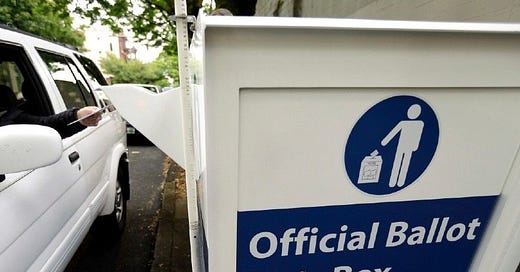Powering the Vote: An Oregonian's View on the Importance of Voter Protection
Oregon is the easiest state in which to vote, but residents of some states face increasing obstacles and need our help
The east wind is howling in Corbett, Oregon, the unincorporated community that's been my home for more than 30 years. I've just finished my third shift as a volunteer helping Texas voters navigate intentional barriers to their ability to vote. This same day, Russia invaded Ukraine. The fight for democracy, for free and fair elections, has never felt so urgent.
Oregon Pioneers Vote-by-mail
As an Oregonian, I've been lucky to live in a voter-friendly state. Oregon pioneered vote-by-mail and, since 2000, has mailed registered voters a ballot for every election. There are no confusing ID requirements or “tests” to pass. A registered voter can fill out their ballot, put it in the secrecy envelope, sign the back of the mailing envelope and have the option to mail it, drop it in a drop box, or drop it at the elections office.
I have confidence that my vote will be counted, even if the election doesn't go the way I would like. If we want democracy to survive in America and continue to be a model for the world, all eligible voters must be able to cast a ballot that is counted. Voting and democracy should not be partisan issues.
Battleground states are making it harder for voters to vote
I volunteered in Texas to help voters overcome barriers to voting. Texas has a history of suppressing the vote, and complicated, confusing new election laws have raised new hurdles for voters. For example, vote-by-mail ballot applications are being rejected at unprecedented rates of 50% due to confusing new voter ID requirements under Republican-backed Senate Bill 1. When voters clear the application process more obstacles await. Vote-by-mail ballots are similarly being rejected at high rates – up to 40% – because of new requirements.
And it's not just Texas. Similar attempts at voter suppression are happening in other states, and an analysis in Georgia shows that new hurdles to voting disenfranchised many voters in the municipal elections in November 2021. This makes year-round, on-the-ground state voter protection more urgent than ever before.
Voter Protection Can Make a Difference
These impacts from voter suppression laws are not just deeply concerning – they are also a call to action. I wanted to find a way to get involved and make a difference, even from a long distance. A voter protection organization called Power the Vote helped me connect with the Texas voter protection hotline so that I could help voters impacted by S.B. 1.
The team behind Power the Vote built the voter protection program for the Democratic Party of Georgia during the 2020 cycle. That program was grounded in grassroots organizing and year-round relationship building – with elections officials, voters, and volunteers. And it made a tangible impact for Georgia voters.
Even in 2020, before the passage of Georgia’s new voter suppression law, Georgia was ranked the second-most-difficult state to vote, according to analysis by Northern Illinois University. (Oregon, by contrast, ranked as the easiest state to vote!) And amid the pandemic, Georgia voters faced significant voting challenges, including long lines and difficulty voting by mail. But Georgia shows that, even in states where it’s difficult to vote, voters can still overcome voter suppression to have their voices heard.
Fighting against the odds, the Georgia voter protection team and an army of volunteers helped hundreds of thousands of Georgia voters cast their ballots. The team suggested improvements to a confusing absentee ballot application form, which the Secretary of State accepted and mailed to 7 million registered voters across the state and ultimately used by 1.3 million Georgia voters to vote.
The Georgia voter protection hotline received 130,000 calls in seven languages and answered voters questions to help them overcome barriers to voting. The program worked with elections officials in key counties to overcome long lines by advocating for 36 additional early voting locations and 6,000 additional hours of voting. And in the General Election, the program helped 15,000 voters fix problems with their absentee ballots to ensure those votes would be counted.
More work to be done to protect the vote in battleground states
Georgia shows what is possible – even in states with a significant history of voter suppression. The leaders of the Georgia voter protection team founded Power the Vote to expand their voter protection work to other battleground states – Texas, Arizona, Florida, and North Carolina. Their mission is to fund and support permanent, year-round voter protection teams in these states. They aim to ensure that every voter can vote, that every vote is counted, and every lawful election win is certified.
Power the Vote’s mission resonates with me – and the opportunity to help voters in Texas is meaningful, particularly given how comparatively easy it is to vote in my home state. For this Oregonian, nothing is more important right now than working to protect the sacred right to vote for all Americans. Without a voice in electing our leaders, we have less of a voice in things that are important to us, whether that is our natural environment, health care, worker protection, education, and – as we are seeing with Russia's war on Ukraine – national security.
If each of us does our part, we can help voters overcome voter suppression. To find out more about how you can support voting rights or get more involved, visit Power the Vote’s website and sign up to be a voter protection volunteer. And thank you for voting!
Lauri Aunan is a resident of Corbett and a volunteer with Power the Vote.





